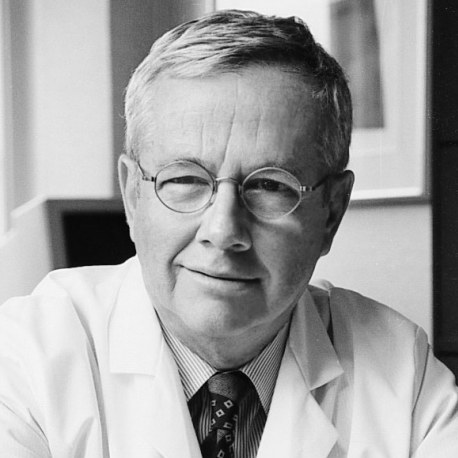 Dr Sheldon Pinnell
Dr Sheldon PinnellAs SkinCeuticals founding scientist, Dr. Pinnell changed the face of topical Vitamin C Serums with his pivotal research. More than just a dermatologist, professor and skincare chemist, meet the man behind the lab coat and hear him explain his ground breaking work.
Dr. Pinnell passed away July 2013. His quest for knowledge and dedication to skin science was paramount for establishing SkinCeuticals as the antioxidant authority. His work will continue to inspire our research and promote our mission, which is to develop advanced skincare solutions backed by science.
Dr. Pinnell received his Medical Degree from Yale University, conducted his medical internship and residency at the University of Minnesota Hospital in Minneapolis, Minnesota, and completed his dermatology training at Harvard University and Massachusetts General Hospital in Boston, Massachusetts. Dr. Pinnell conducted his research training as a collagen chemist at both the National Institutes of Health in Bethesda, Maryland and also the Max Planck Institute for Biochemistry in Munich, Germany. Dr. Pinnell earned his Bachelor of Arts degree in Chemistry at Duke University, where he graduated with Phi Beta Kappa academic honours.
Dr. Pinnell's skin science research earned him eight patents over the course of his career. The most important patent in SkinCeuticals history pertains to "A Stable Solution of L-Ascorbic Acid (Vitamin C)." The formulation standards put forth in this study are now known as the Duke Antioxidant patent. Three additional patents have supplemented Dr. Pinnell's initial patent, one for the formulation-specific application to protect the ingredient combination used in Skin Firming Cream and Eye Cream; another to protect the combination used in SkinCeuticals C+E skincare products; and a third to protect the formulation used in SkinCeuticals phloretin skincare products. Together, these patents provided a firm foundation for all SkinCeuticals antioxidant products.
A distinguished member of the Duke University Medical School faculty for almost 40 years, Dr. Pinnell was a professor of dermatology, held the title of J. Lamar Callaway Professor Emeritus of Dermatology, and also served as Chief of Dermatology at Duke University Medical Centre for 15 years. At Duke, he trained physicians from the United States and abroad both as dermatologists and research scientists. With almost four decades of experience in skin cancer, skin disease, and skin ageing research, Dr. Pinnell published more than 200 scientific articles about topical vitamin C, antioxidants, collagen synthesis, and photo-damage in peer-reviewed dermatology journals.
Dr. Pinnell had 100 peer-reviewed publications, including many related directly to the topical antioxidant innovative technologies
Additional peer-reviewed publications prove the ineffectiveness of other antioxidants - including alpha lipoic acid, ubiquinone, idebenone, and kinetin - in protecting skin from oxidative stress
As one of the most well respected doctors and skin scientists of our time, Dr. Sheldon Pinnell has won countless awards and accolades. Among his key recognitions:
In 2013, the Duke University School of Medicine and the Department of Dermatology created The Sheldon Pinnell Centre for Investigative Dermatology to honour Dr. Pinnell's unwavering commitment to the discovery of new and innovative methods of treating skin diseases and to training the next generation of young investigators. The establishment of the Pinnell Center provides a comprehensive program for investigative dermatology through support for early career investigators with initial funding; support for post-doctoral fellow training; funding for innovative proposals and new projects focused on translational research leading to new therapies for skin disease; and the enrichment of the investigative community through regular seminar series, development of core facilities and laboratories, and support for translational and clinical research.
With a vision to build a world-renowned Department of Dermatology, Dr. Pinnell marked his tenure as division chief from 1982-1997 with bold strategic initiatives, including the recruitment of new clinicians and investigators, establishing new areas of research in immuno-dermatology and connective tissue, as well as initiating new clinical efforts in wound care, laser medicine, dermatologic surgery, and paediatric dermatology. His efforts and those who have come before and after him culminated in the establishment of the Department of Dermatology in 2009, highly regarded today for innovation and excellence in research, clinical care, and training.
The Pinnell Centre serves as an enduring legacy of the faculty, staff and students' appreciation and gratitude to Dr. Pinnell for his loyalty, mentoring, enthusiastic embrace of academic life, intellectual curiosity and outstanding leadership that has positioned Duke University's Department of Dermatology as a national and world leader.